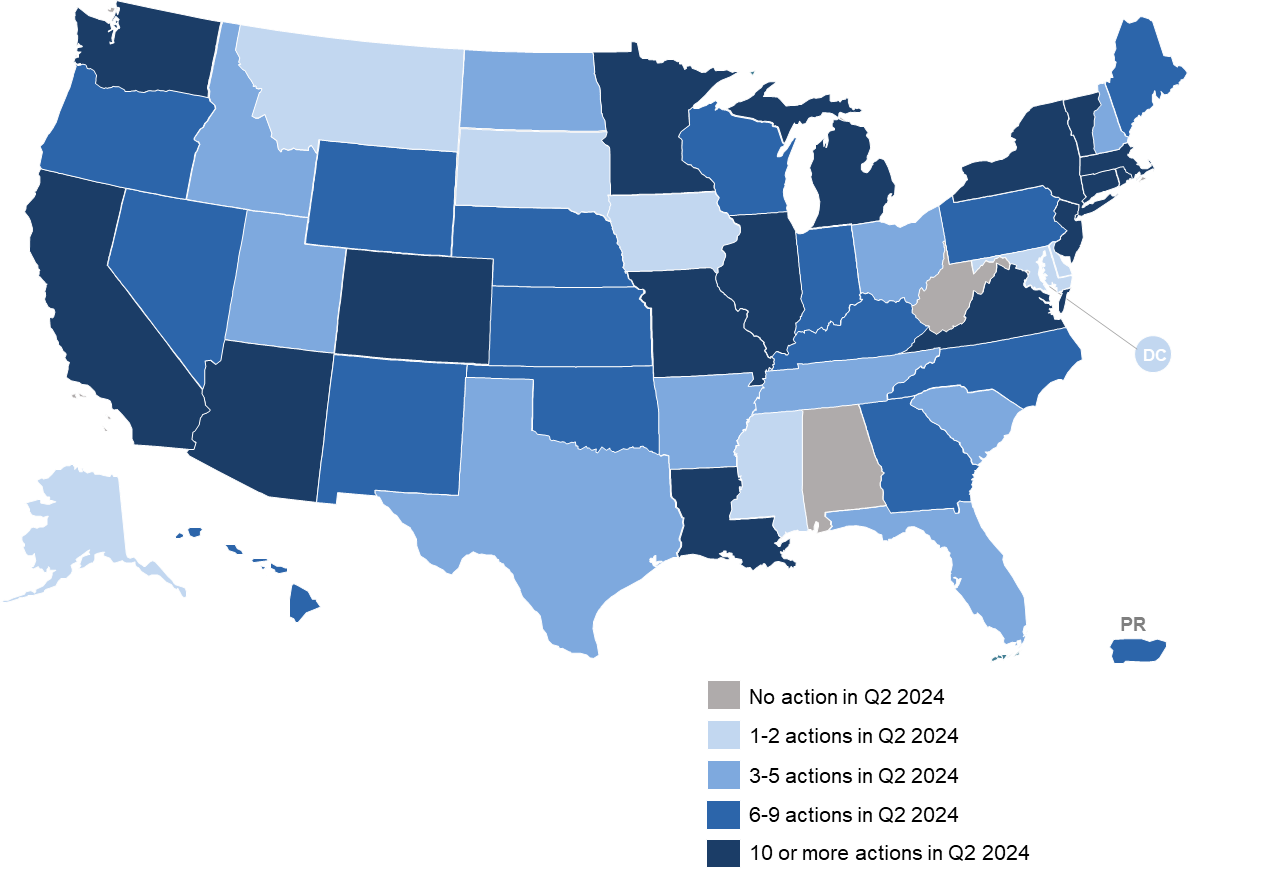50 States of Power Decarbonization Q2 2024: Utilities Plan to Add Clean Dispatchable Generation, While States Address Advanced Nuclear and Offshore Wind
Raleigh, NC – (August 20, 2024) The N.C. Clean Energy Technology Center (NCCETC) released its Q2 2024 edition of the 50 States of Power Decarbonization. The quarterly series provides updates on state and utility actions pertaining to clean energy targets, emission reduction targets and carbon policies, generation planning and procurement rules, integrated resource plans, and electric generation capacity changes (RFPs, green tariffs, power plant retirements, etc.).
The Q2 2024 report finds that 48 states, as well as DC and Puerto Rico, took a total of 471 actions related to electric power decarbonization and resource planning during the quarter (see figure below). Among integrated resource plans recently filed or under review by regulators in Q2 2024, planned capacity additions totaled 92,179 MW for solar, 49,773 MW for wind, 41,987 for natural gas, and 32,207 for storage, while planned coal retirements totaled 36,219 MW.
Q2 2024 Action on Power Decarbonization and Resource Planning

The report discusses three trends in power decarbonization actions taken in Q2 2024: (1) utilities planning future clean dispatchable generation additions; (2) states studying the potential of advanced nuclear; and (3) states advancing the procurement of offshore wind energy.
“This quarter, multiple states enacted legislation directing agencies and regulators to study the feasibility of deploying advanced nuclear technologies,” noted Justin Lindemann, Policy Analyst at NCCETC. “From potential workforce needs to site suitability, states like Florida and Kentucky are showing interest in Generation IV nuclear advancements. At the same time, legislators in New Hampshire sent the state’s Governor an advanced nuclear study bill to sign.”
The report notes the top five policy developments of Q2 2024 were:
- Vermont lawmakers adopting a 100% renewable energy standard;
- Florida legislators banning offshore wind development;
- NV Energy filing a Clean Transition Tariff proposal with Nevada regulators;
- Delaware lawmakers passing an offshore wind target; and
- The Kansas Legislature adopting new requirements for plant retirements.
“As utilities develop long-term resource plans, there is a growing focus on clean dispatchable generation as an alternative to standard natural gas-powered generation,” observed Rebekah de la Mora, Senior Policy Analyst at NCCETC. “While some utilities are proposing specific alternatives – like hydrogen blending, biofuels, or carbon capture – others are proposing technology-neutral clean dispatchable generation, with the expectation that new technologies will be developed, refined, and cost-effective by the time the procurement year arrives.”
View the 50 States of Power Decarbonization Q2 2024 Quarterly Report Executive Summary
View and Purchase the 50 States of Power Decarbonization Q2 2024 Quarterly Report
View other 50 States Reports – Solar, Grid Modernization, Electric Vehicles and Decarbonization
ABOUT THE NC CLEAN ENERGY TECHNOLOGY CENTER
The NC Clean Energy Technology Center, as part of the College of Engineering at North Carolina State University, advances a sustainable energy economy by educating, demonstrating and providing support for clean energy technologies, practices and policies. It serves as a resource for innovative, sustainable energy technologies through technology demonstration, technical assistance, outreach and training. For more information about the Center, visit: http://www.nccleantech.
Media Contact: Shannon Helm, shannon_helm@ncsu.edu